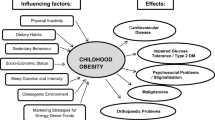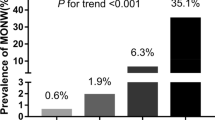Abstract
Purpose
The metabolic syndrome (MetS) in adolescents is a growing problem. The objectives were to verify the association among early predictors such as birth weight, breastfeeding, maternal weight status, smoking during pregnancy, and the development of MetS.
Methods
A cross-sectional study was performed of 976 children and adolescents, 10–15 years of age, at schools in the provinces of Granada and Almeria (Spain). For this purpose, we analyzed the physical characteristics as well as the biochemical markers of the participants with a view to ascertaining the prevalence of the MetS. Relevant data were also extracted from the clinical histories of their mothers.
Results
It was found that 3.85 % of the female subjects and 5.38 % of the male subjects in the sample population suffered from MetS. In both sexes, there was an association between birth weight and positive MetS diagnosis (OR 1.27). For both males and females, there was an inverse association between the length of time that they had been breastfed and positive MetS diagnosis (OR1–3 months 3.16; OR4–6 months 1.70; OR>6 months 0.13). There was also a significant association between maternal weight (ORoverweight 30.79; ORobesity 49.36) and cigarette consumption during pregnancy (OR 1.47) and the subsequent development of MetS in the children of these mothers.
Conclusions
Those subjects born with a higher than average birth weight had a greater risk of developing MetS in childhood and adolescence. Breastfeeding children for longer than 6 months protected them from MetS in their early years as well as in their teens. Other risk factors for MetS were maternal smoking during pregnancy as well as maternal overweight and obesity.
Similar content being viewed by others
References
Tapia Ceballos L (2007) Síndrome metabólico en la infancia. An Pediatr (Barc) 66:159–166
Bahar A, Hosseini Esfahani F, Asghari Jafarabadi M, Mehrabi Y, Azizi F (2013) The structure of metabolic syndrome components across follow-up survey from childhood to adolescence. Int J Endocrinol Metab 11:16–22
Montero-Alonso MA, González-Jiménez E (2013) Valoración del estado nutricional, resistencia insulínica y riesgo cardiovascular en una población de adolescentes de la ciudades de Granada y Almería. Nutr Hosp 28:802–806
Ford ES, Li C (2008) Defining the metabolic syndrome in children and adolescents: will the real definition please stand up? J Pediatr 152:160–164
Mangge H, Summers KL, Meinitzer A, Zelzer S, Almer G, Prassl R, Schnedl WJ, Reininghaus E, Paulmichl K, Weghuber D, Fuchs D (2013) Obesity-related dysregulation of the Tryptophan–Kynurenine metabolism: role of age and parameters of the metabolic syndrome. Obesity (Silver Spring) 22:195–201
Ekelund U, Anderssen S, Andersen LB, Riddoch CJ, Sardinha LB, Luan J, Froberg K, Brage S (2009) Prevalence and correlates of the metabolic syndrome in a population-based sample of European youth. Am J Clin Nutr 89:90–96
Zimmet P, Alberti KG, Kaufman F, Tajima N, Silink M, Arslanian S, Wong G, Bennett P, Shaw J, Caprio S, IDF Consensus Group (2007) The metabolic syndrome in children and adolescents: an IDF consensus report. Pediatr Diabetes 8:299–306
Korner A, Kratzsch J, Gausche R, Schaab M, Erbs S, Kiess W (2007) New predictors of the metabolic syndrome in children: role of adipocytokines. Pediatr Res 61:640–645
Simmons RK, Alberti KGMM, Gale EAM (2010) The metabolic syndrome: useful concept or clinical tool? Report of a WHO Expert Consultation. Diabetologia 53:600–605
Ahmadi A, Gharipour M, Nouri F, Sarrafzadegan N (2013) Metabolic syndrome in Iranian youths: a population-based study on junior and high schools students in rural and urban areas. J Diabetes Res 2013:738485
Ekelund U, Ong KK, Linné Y, Neovius M, Brage S, Dunger DB, Wareham NJ, Rössner S (2007) Association of weight gain in infancy and early childhood with metabolic risk in young adults. J Clin Endocrinol Metab 92:98–103
Crespo PS, Prieto Perera JA, Lodeiro FA, Azuara LA (2007) Metabolic syndrome in childhood. Public Health Nutr 10:1121–1125
Agius R, Savona-Ventura C, Vassallo J (2013) Transgenerational metabolic determinants of fetal birth weight. Exp Clin Endocrinol Diabetes 121:431–435
McCance D, Pettitt D, Hanson R, Jacobsson L, Knowler W, Bennett P (1994) Birth weight and non-insulin dependent diabetes: thrifty genotype, thrifty phenotype, or surviving baby genotype? BMJ 308:942–945
Stuebe A (2009) The risks of not breastfeeding for mothers and infants. Rev Obstet Gynecol 2:222–231
Verd S, Barriuso L, Gich I, Gutiérrez A, Nadal-Amat J, Carreras E (2013) Risk of early breastfeeding cessation among symmetrical, small for gestational age infants. Ann Hum Biol 40:146–151
Oddy WH (2012) Infant feeding and obesity risk in the child. Breastfeed Rev 20:7–12
Yang Z, Huffman SL (2013) Nutrition in pregnancy and early childhood and associations with obesity in developing countries. Matern Child Nutr 9:105–119
Huang RC, Burke V, Newnham JP, Stanley FJ, Kendal GE, Landau LI, Oddy WH, Blake KV, Palmer LJ, Beilin LJ (2007) Perinatal and childhood origins of cardiovascular disease. Int J Obes 31:236–244
Behl M, Rao D, Aagaard K, Davidson TL, Levin ED, Slotkin TA, Srinivasan S, Wallinga D, White MF, Walker VR, Thayer KA, Holloway AC (2013) Evaluation of the association between maternal smoking, childhood obesity, and metabolic disorders: a national toxicology program workshop review. Environ Health Perspect 121:170–180
Sánchez-Muniz FJ, Gesteiro E, Espárrago Rodilla M, Rodríguez Bernal B, Bastida S (2013) Maternal nutrition during pregnancy conditions the fetal pancreas development, hormonal status and diabetes mellitus and metabolic syndrome biomarkers at birth. Nutr Hosp 28:250–274
Ryckman KK, Borowski KS, Parikh NI, Saftlas AF (2013) Pregnancy complications and the risk of metabolic syndrome for the offspring. Curr Cardiovasc Risk Rep 7:217–223
Boney CM, Verma A, Tucker R, Vohr BR (2005) Metabolic syndrome in childhood: association with birth weight, maternal obesity, and gestational diabetes mellitus. Pediatrics 115:290–296
Cole TJ, Bellizzi MC, Flega KM, Dietz WH (2000) Establishing a standard definition for child overweight and obesity worldwide: international survey. BMJ 320:1–6
Brook CGD (1971) Determination of body composition of children from skinfold measurements. Arch Dis Child 46:182–184
Siri WE (1961) Body composition from fluid spaces and density: analysis of methods. In: Brozeck J, Henschel A (eds) Techniques for measuring body composition. National Acad Sci National Res Council, Washington
Berson S, Yellow RS (1959) Quantitative aspects of the reaction between insulin and insulin-binding antibody. J Clin Invest 38:1996–2016
Aguayo Calcena AA (2011) Prevalencia del síndrome metabólico en una población de niños obesos en el País Vasco, su relación con la resistencia a la insulina, las adipoquinas y ghrelina. (PhD thesis). Universidad del País Vasco
Studies to Treat or Prevent Pediatric Type 2 Diabetes (STOPP-T2D) Prevention Study Group* (2008) Prevalence of the metabolic syndrome among a racially/ethnically diverse group of U.S. eighth-grade adolescents and associations with fasting insulin and homeostasis model assessment of insulin resistance levels. Diabetes Care 31:2020–2025
Pan Y, Pratt CA (2008) Metabolic syndrome and its association with diet and physical activity in US adolescents. J Am Diet Assoc 108:276–286
Chen SK, Luo JS, Qin YF, Fan X, Tang Q, Feng Y (2011) Epidemiological study on the association between obesity with metabolic syndrome in obese children and adolescents of Nanning city, Guangxi. Zhonghua Liu Xing Bing Xue Za Zhi 32:969–972
Wang SQ, Liu YJ, Zhan J, Liu XL, Feng Q, Gong J, Talbott EO, He QQ (2013) Determinants of metabolic syndrome in Chinese schoolchildren. Asia Pac J Public Health 4. doi:10.1177/1010539513496137
Eriksson JG, Osmond C, Kajantie E, Forsén TJ, Barker DJP (2006) Patterns of growth among children who later develop type 2 diabetes or its risk factors. Diabetologia 49:2853–2858
Khuc K, Blanco E, Burrows R, Reyes M, Castillo M, Lozoff B, Gahagan S (2012) Adolescent metabolic syndrome risk is increased with higher infancy weight gain and decreased with longer breastfeeding. Int J Pediatr 5:478610
Yang Z, Huffman SL (2013) Nutrition in pregnancy and early childhood and associations with obesity in developing countries. Matern Child Nutr 9:105–119
De Armas MG, Megías SM, Modino SC, Bolaños PI, Guardiola PD, Alvarez TM (2009) Importance of breastfeeding in the prevalence of metabolic syndrome and degree of childhood obesity. Endocrinol Nutr 56:400–403
Ekelund U, Anderssen S, Andersen LB, Riddoch CJ, Sardinha LB, Luan J, Froberg K, Brage S (2009) Prevalence and correlates of the metabolic syndrome in a population-based sample of European youth. Am J Clin Nutr 89:90–96
Ornoy A (2011) Prenatal origin of obesity and their complications: gestational diabetes, maternal overweight and the paradoxical effects of fetal growth restriction and macrosomia. Reprod Toxicol 32:205–212
Merritt TA, Mazela J, Adamczak A, Merritt T (2012) The impact of second-hand tobacco smoke exposure on pregnancy outcomes, infant health, and the threat of third-hand smoke exposure to our environment and to our children. Prz Lek 69:717–720
Noda T (2013) Effects of tobacco smoke on fetus and children. Nihon Rinsho 71:454–458
Conflict of interest
The authors declare they have no competing interests.
Author information
Authors and Affiliations
Corresponding author
Rights and permissions
About this article
Cite this article
González-Jiménez, E., Montero-Alonso, M.A., Schmidt-RioValle, J. et al. Metabolic syndrome in Spanish adolescents and its association with birth weight, breastfeeding duration, maternal smoking, and maternal obesity: a cross-sectional study. Eur J Nutr 54, 589–597 (2015). https://doi.org/10.1007/s00394-014-0740-x
Received:
Accepted:
Published:
Issue Date:
DOI: https://doi.org/10.1007/s00394-014-0740-x




